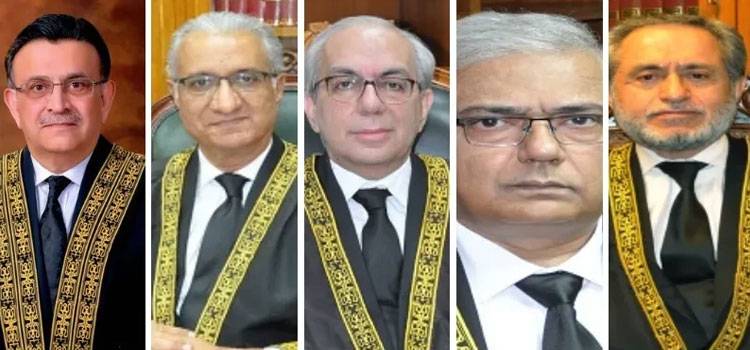
Pakistan’s judiciary is going through turmoil, evident by the resignation of two supreme court judges, Justice Ijazul Ahsan and M.A.A. Naqvi. The resignation of these two judges has shaken Pakistan’s political and legal system. This is the question mark on the integrity of Pakistan’s court. There is a clear indication of political interference in the resignation of judges, as always happened during the general elections in Pakistan. The situation became tense after Ijajul Ahsan quit his position as he was about to become the chief justice of Pakistan. This has obstructed the succession of leadership in Pakistan’s judicial system.
The resignation of Justice Ahsan and Justice Naqvi occurred amidst a Supreme Court that has been divided since May 2019. This has created tension and rift in the court, with justices indulging in camping. These have caused disruptions in the functioning of the code, the maintenance of independence, and the rule of law. Pakistan’s judiciary has always been an arena for fulfilling political interests and controlling the country. Political elites, military superiors and influential business people have always tried influencing the judiciary to benefit their interests. This has led to external forces intervening in Pakistan’s judicial system, compromising the judiciary’s autonomy.
Corruption, inefficiency of the system, and long pending court cases have erased the public’s faith in Pakistan’s judicial system. In addition, the recent resignations have further deteriorated the situation, portrayed the judicial system as ineffective in delivering justice, and proven the ineffectiveness of the judiciary in Pakistan. It is the need of the hour for Pakistan’s judiciary to advocate accountability, encourage transparency, endorse professionalism at one end and prevent itself from external interference on the other end. Furthermore, all the stakeholders must refrain from putting pressure on the judiciary and respect the court’s decision.
The arrest of Imran Khan, former prime minister of Pakistan, has driven Pakistan into a political tumult. This has raised the doubt of military involvement in the arrest of the former Prime Minister and interference in the internal politics of Pakistan. The supporters of Imran Khan in Pakistan have raised concerns that the arrest was plotted by high-ranking officials in the military, and this has escalated the tension between the civil and military organisations in Pakistan.
In the middle of a judicial crisis and political turmoil, Pakistan is engulfed in an economic crisis that has led to increasing instability. A continuous increase in debt further corrodes the country from the inside. The stability of Pakistan is a vital concern in the international arena, especially for the United States, as Pakistan depends highly on the aid provided by the USA. Pakistan being a nuclear state also raises serious concerns, as if it falls as a state and the judiciary, being one of the main pillars in the country, cannot hold the country solely if the economic and political system fails.
There are allegations that the judiciary nowadays in Pakistan is facing intimidation from ISI, the intelligence agency of Pakistan. These allegations have proven to be true when six judges of Pakistan have said that the intelligence agencies are interfering, to an extreme extent, in politically sensitive cases. Later on, the government set up an enquiry commission. This shows that the government wants the judiciary to be autonomous and function appropriately for the country’s welfare. This intimidation by the intelligence agencies to corrupt the judicial system to gain political leverage and fulfil their illegal interests turned the judicial system into no more than a puppet organisation. The enquiry commission must function independently and sacrosanct to unwrap the truth. If the enquiry commission has to work effectively, it must avoid political and military influence. The commission’s findings will have very large-scale implications in the democratic structure of Pakistan that are beyond the investigation of the specific allegations.
Pakistan’s judiciary’s challenges require a cautious and comprehensive approach to tackle. The transparency and effectiveness of the judiciary can be maintained by implementing reforms within the judicial system. Improving the appointment system and promoting judges according to merit is a necessary step to be adopted. Initiatives should be taken to curb corruption within the judicial system and promote ethical conduct among the lawyers and judges. Constructive and comprehensive engagement through dialogues is essential to address the political turmoil that often influences sensitive cases. Political parties should stop interference in the judicial process for their benefit, respect the judges, and believe in the decisions provided by the judiciary. The rule of law should be established to strengthen the democratic values in the country. To maintain integrity and sustain impartiality, it is significant to safeguard the independence of one of the prominent pillars of democracy, i.e., the judiciary. The collapse of the judicial system in Pakistan will lead to the collapse of Pakistan as a nation-state, which will ultimately influence India and the whole South Asian region, creating disorder in the international arena.
References






